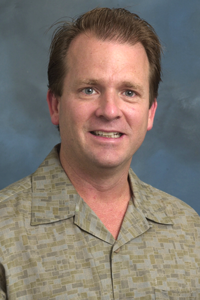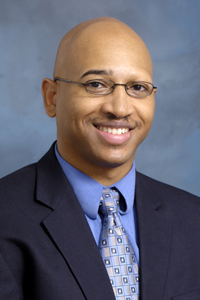Two Epidemiology and Biostatistics faculty earn national recognition for scholarly achievements
August 27, 2010

James W. Hardin

Sacoby Wilson
Arnold School of Public Health research faculty members Dr. James W. Hardin and Dr. Sacoby Wilson, both from the Department of Epidemiology and Biostatics, have earned national recognition.
Hardin is the 2010 recipient of the H.O. Hartley Award, a major honor presented annually to a former student from the Department of Statistics at Texas A&M University.
Wilson has been selected to serve on the National Academy of Sciences Committee on Exposure Science in the 21st Century.
Hardin, who joined USC’s faculty in 2003, is a research associate professor. He also works on funded research with the Arnold School’s Center for Health Services and Policy Research and the Rural Health Research Center, and the university’s Institute for Families in Society.
A native Texan, Hardin grew up San Antonio, and earned his bachelor’s, master’s and doctoral degrees from TAMU.
“I remember seeing the names of each year’s winner on a plaque in the department when I was a student. It’s a wonderful feeling that my name is joining the list,” Hardin said.
The Hartley Award is named in honor of Dr. H. O. Hartley who founded the TAMU Institute of Statistics in 1962. He was a pioneer and leader in the development of the theory and real-world applications of statistics.
The intent of the award is to recognize former students who reflect the Hartley tradition of outstanding service to the discipline in the broadest sense. The award was given for the first time in 1980. Hardin’s award was presented during the 2010 Joint Statistical Meeting in Vancouver.
Hardin has written several textbooks, including Generalized Linear Models and Extensions (2001, 2007), Generalized Estimating Equations (2002), and Common Errors in Statistics and How to Avoid Them (2003, 2006, 2009). He maintains an active research agenda and is the co-author of manuscripts on diet, nutrition, cognitive psychology, HIV, sexual behavior, cancer, and health services.
Wilson, the chair of the Environment Section of the American Public Health Association, also has been elected to the Board of Directors of the Community-Campus Partnerships for Health (CCPH), an organization that utilizes community-university partnerships to promote health.
A researcher with USC’s Institute for Families in Society, Wilson is a research assistant professor in the Department of Epidemiology and Biostatistics. His areas of expertise include environmental health research, exposure assessment, spatiotemporal mapping, air pollution monitoring, and environmental and social epidemiology.
Wilson is the principal investigator on a $1.2 million grant from the National Institute of Environmental Health Sciences to help residents address environmental injustice, public health, and revitalization issues in seven disadvantaged neighborhoods in North Charleston, S.C. The project will identify air, water, and soil pollutants and their impact on the neighborhoods.
He recently was awarded an administrative supplement for the NIEHS grant to fund undergraduate student training in environmental justice and health disparities.
The Community-Campus Partnerships for Health (CCPH), based in Seattle, Wash., is a nonprofit organization that promotes health through partnerships between communities and higher educational institutions. Founded in 1996, CCPH is a growing network of more than 2,000 communities and campuses that are collaborating to promote health through service-learning, community-based participatory research, broad-based coalitions and other partnership strategies. CCPH board members represent governmental agencies, community-based organizations, academic institutions, and other non-profit organizations.



_01.jpg)
_02.jpg)